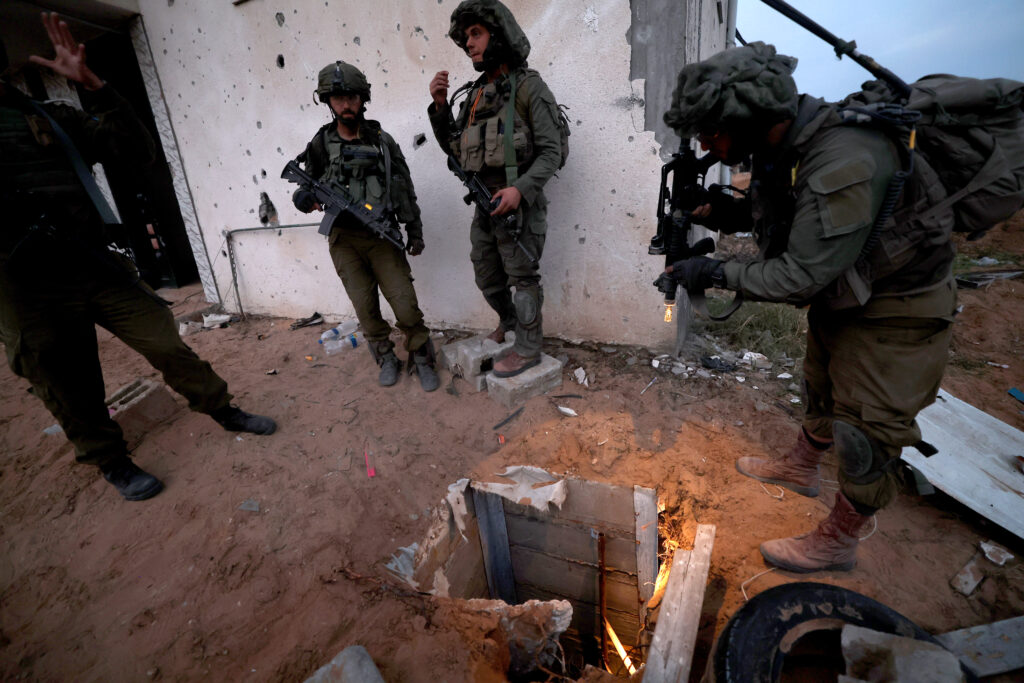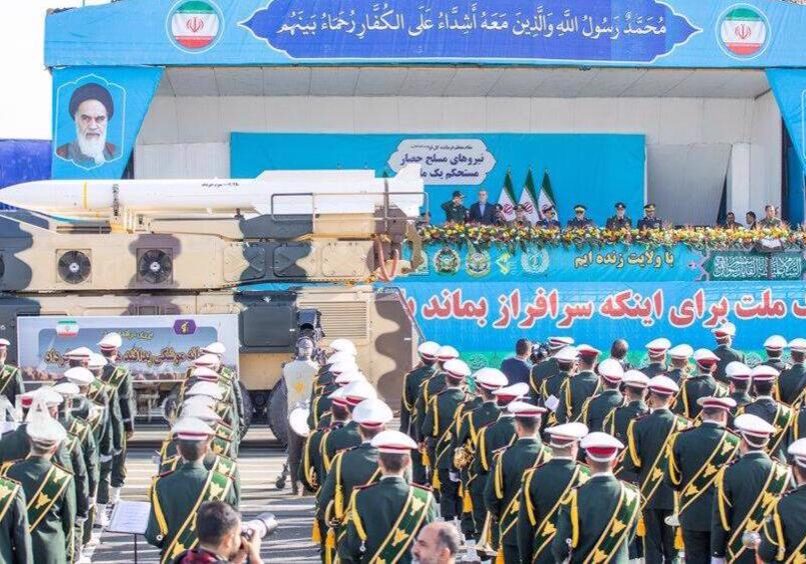Australia/Israel Review
Interview: Getting Gaza wrong
Oct 21, 2024 | Ariel Kahana

As we began our Zoom call, John Spencer made a statement that should resonate globally. “Everything that the world has heard about Gaza has actually been counterfactual. It has been wrong. What Israel has done to protect civilians, and despite what Hamas has wanted, has been an amazing achievement that I didn’t even, personally as an urban warfare scholar, think was possible.”
Major John Spencer speaks from extensive experience. After a long combat career in the US Army, including two tours in Iraq as both soldier and commander, Spencer emerged as one of the world’s foremost experts in urban warfare. Many consider him the top authority in the field.
Currently, he leads Urban Warfare Studies at West Point, the US Military Academy, regularly advising top brass in the US military and other armies. Spencer also co-founded the “International Working Group on Subterranean Warfare” and has authored three books in these fields.
Recently, he visited Israel for the annual Shabtai Shavit International Conference on October 6 & 7, organised by the International Institute for Counter-Terrorism (ICT) at Reichman University.
He claims the war Israel has waged since October 7 defies comparison to any previous military conflict. “I wrote an article explaining that it’s like comparing apples to oranges,” Spencer said.
“Israel has once again proven that when attacked, it can achieve the impossible. Its actions in Gaza since October 7, despite Hamas’ 15 years of fortification and preparation, 385 miles of tunnels, a strategy of human shields, the hostage crisis, and simultaneous attacks from Hezbollah, Iran, and the Houthis – are unprecedented. No other army in the world has done this, and I believe none is capable of it. Some might interpret this as Israeli weakness. As a military analyst, I see it as a testament to Israel’s unique capabilities.”
He adds, “I acknowledge Hamas’ planning for October 7, likely supported by another state. But the attack wasn’t worse only because the Israelis have been fighting back ever since.”
October 7 dealt a severe blow to Israeli deterrence, a cornerstone of regional stability that had kept both adversaries and allies in check across the Middle East for decades. Have Israel’s recent actions, including the alleged pager attack, restored this deterrent image?

Retired US Major John Spencer (Image: X/ @SpencerGuard)
“October 7 was catastrophic for Israel’s regional security perception, reflecting accumulated threats and global miscalculations about the hierarchy of threats, including existential ones to Israel. But October 7 has been transformative – for Israel, the Middle East, and hopefully, the world. The Iranian regime’s grand strategy aims to destroy Israel, and then target the US, using proxy armies. The approach to these terrorist proxies was misguided, not just by Israel but globally. Israel’s security paradigm, internal defences, military size, technological reliance, and assumptions about Hamas’ true intentions all proved problematic. Yet, as in past crises, Israel has demonstrated its ability to achieve the seemingly impossible when attacked. Moreover, Israel’s allies have shown it doesn’t stand alone. As an American, I take pride in US military efforts to intercept Iranian rockets, missiles, and drones, with support from Arab nations like Saudi Arabia and Jordan.
“Personally, I’m disheartened by the global disinformation campaign against Israel. It exploits very old antisemitic beliefs about Israel and its actions. But I think Israel has also demonstrated its strength through this – not just to the US, but to many regional allies. You’ve had to navigate an incredibly complex strategic environment, unparalleled outside of Israel. Israel must fight these existential wars, yet still finds a way to achieve the unthinkable. I believe that’s what we’ve witnessed since October 7. Oct. 6 can never recur in any domain.”
Do you think our region shares this view? In other words, do the countries that have made peace with us, and even those that haven’t, believe Israel has restored its deterrence?
“That’s a crucial question. Whether we’re talking about proxy terrorist armies or the Islamic regime itself – I believe Israel’s strength has been proven. I think Hamas and Hezbollah expected to inflict much more damage, but Israel’s power has been displayed to the world. The question is whether the Islamic regime in Iran will change its approach.”
That’s precisely the question. In Teheran’s eyes, do you think Israel appears stronger or weaker than on October 6?
“I believe they think they struck Israel when it was vulnerable, causing multi-year damage in many areas that Israel will need to recover from. But this also exposed Israel’s strengths. They had one opportunity. It revealed Israel’s weaknesses, but also the truth – that the US doesn’t abandon Israel under direct attack from the Islamic regime, and the fact that someone eliminated a very important terrorist under the Islamic regime’s protection [Ismail Haniyeh]. So all these are signals of strength. Not absolute power. I don’t think the Iranians will abandon their strategy to destroy Israel, but they’ll need to recalculate their approach now that their ‘hands’ have been exposed. So they’ll be more cautious about Israel’s strength now, but they still believe they can achieve their long-term goal.”
Let’s return to Lebanon. What does international law permit our soldiers to do in southern Lebanon?
“Well, under international law, especially Article 51 of the UN Charter, Israel can do what’s necessary to defend itself against attack. There’s a significant difference from Gaza, as in Lebanon there’s a place where civilians can be safely evacuated. In Gaza, due to Egypt, civilians had no exit point from the combat zone. In Lebanon, it’s different. So soldiers can operate within all the laws of war, proportionality, necessity, to do what’s needed to remove the threat that has persisted for 11 months.”
The World’s Hypocrisy
“The international courts, the International Criminal Court (ICC) and the International Court of Justice (ICJ), risk making their own true objectives very irrelevant in the international community,” Spencer says. “The reason is that both cases against Israel, especially in the ICC, lack foundation. They’re not based on any evidence – not on field investigations, nor complementary investigations. These are cases based on accusations and statements, usually relying on what we call ‘outcome-based analysis’. That’s not how the laws of war work.”
Please explain.
“The investigation shouldn’t examine the results of military action, but rather the decisions that a military commander or leader makes in real-time, based on military necessity, or the measures taken to evacuate civilians from the area. An investigation can’t be based on numbers, certainly not on numbers and statistics from a terrorist organisation, which are inaccurate. These institutions were established for genuine humanitarian goals so that individuals and nations would comply with international law, as Israel does. But they’re becoming irrelevant and undermining their own real legitimacy because they’re deviating from the purposes for which they were established. They shouldn’t have allowed these cases to proceed at all. Everyone can have their own opinions about the number of civilians killed in Gaza, but not their own facts. This shows they’re a political organisation. Therefore, the fact is they’re becoming less relevant. That’s my opinion.”
Their main claim, and that of others against Israel, is the allegedly high number of civilian or non-combatant casualties. They compare the war in Gaza to Mosul, for example.
“There’s actually no comparison. I wrote an article about that showing that that’s apples to oranges. Yes, the Battle of Mosul in 2016 against ISIS was a really big, the biggest battle since World War II, because just 3,000 ISIS fighters were able to hold a city for two years and prepare it for battle, whereas in Gaza, Hamas had two decades almost to prepare every inch of Gaza for war, to have the 400 miles of tunnels, to weaponise the laws of war and what’s called lawfare. There actually is no comparison, especially when they try to compare a single battle to a war. There are ten battles of Mosul in Gaza. There are two Stalingrads there. There’s just no comparison at the scale or the intensity or the preparedness of the urban defender, which means that it’s going to take a lot to get to the urban defender who has built his entire cities for the sole purpose of war, the underground networks, the caches, and buildings. I can’t find a historical example.”
So what would you say to an ambassador who told me that the destruction in Gaza is worse than in Dresden in 1945?
“Tell him to do his homework. The fact is that we dropped three or four times more on Iraq in 40 days than was dropped on Dresden. The number of civilian casualties in Dresden wasn’t known for years, so it’s just a foolish comparison, devoid of context. There were no hostages there, no requirement to enter Dresden on the ground, the objectives of that operation were different, and certainly the damage is not greater. So these are essentially more lies – damned lies.”






